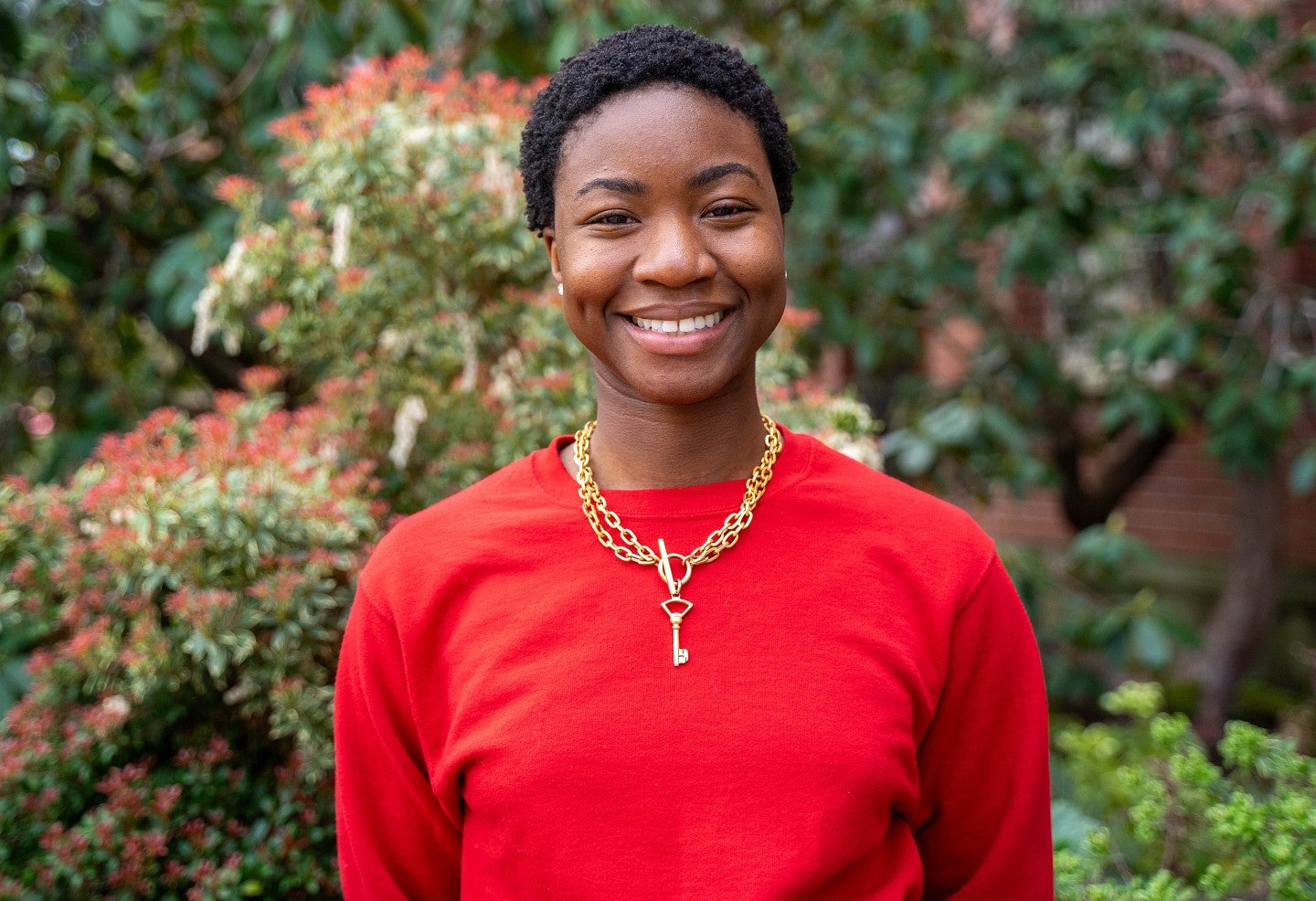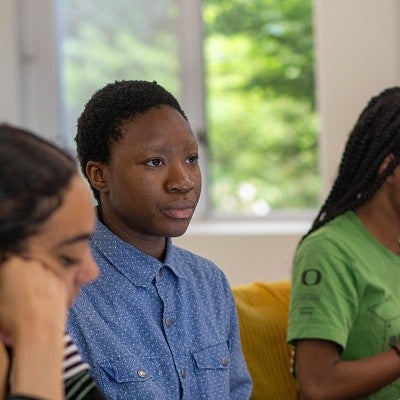
Valerie Owusu-Hienno aspires to be a physician-researcher and global health advocate
Valerie Owusu-Hienno, a third-year student who aspires to be a physician, researcher, and global health advocate, has been named a Goldwater Scholar, a nationally prestigious award for undergraduates conducting research in the natural sciences, engineering, and mathematics.
Owusu-Hienno, a Clark Honors College student and UO Presidential Scholar, is among 441 students to be selected for the scholarship out of a pool of more than 5,000 juniors and seniors. Recipients receive up to $7,500 annually to cover eligible expenses for tuition, fees, books, and room and board.
“It’s confirmation of the effort I’ve put into crafting a research career,” she said. “It definitely went on the CV pretty quickly. It’s nice to have that seal of approval.”
Owusu-Hienno has been conducting research since her first year at the UO. As a pre-med student, she knew that undergraduate research was something valued by medical schools. She earned a research fellowship in the Hui Undergraduate Research Scholars program, a 12-month competitive research program, and worked in the Developing Brains in Context Lab under the mentorship of Kate Mills, associate psychology professor.
Her current research project examines how best to supplement thiamine (Vitamin B1) to mothers in Cambodia to reduce infant mortality from beriberi and to protect infants’ neuro-cognitive development. The research, mentored by psychology professor Dare Baldwin, is in support of her thesis in the honors college and the McNair Scholars Program.
Writing in support of Valerie’s Goldwater application, Baldwin said: “Valerie’s star power is obvious, and she is as deserving of the support of a Goldwater Scholarship as any student I’ve yet encountered over my extended research career.”
A directory of distinguished scholarships and a list of UO distinguished scholarship recipients and finalists are available on the office’s website. Students and their mentors are encouraged to contact the office at dsinfo@uoregon.edu.
Owusu-Hienno is majoring in neuroscience, with minors in biology, chemistry, and global health. She said she grew interested in public health, particularly maternal health, when taking classes in neuroscience and health, and through her involvement in Students for Global Health, a student organization on campus. She learned about social systems that can cause inequities in childbirth and health outcomes, and health practices that can contribute to poorer health outcomes in Black women.
She got interested in epidemiology – the study of patterns and causes of disease in populations to prevent and control outbreaks – while attending the Summer Undergraduate Internship Program at the University of Pennsylvania in 2024, where she conducted biostatistical and public health-focused research.
“That was my first foray into that field – I really loved it,” she said. “It really aligned with the work I imagined myself doing in the future.”

Owusu-Hienno has specific goals in mind for her career: She wants to earn a medical degree and a doctorate, and to work as a physician-scientist in her native Ghana, treating patients, conducting research to improve maternal health outcomes, and running a global health residency for medical students.
Specifically, she wants to develop an international residency program that places American students in Ghanaian hospitals. Such global health residencies are rare, she said, and establishing connections between U.S. and Ghana universities would help inform U.S. resident physicians about ethical best practices in global health and increase access to health care in Ghana.
Owusu-Hienno was born in Ghana and lived there until she was 8 years old, moving to Beaverton in 2012. During her time at the UO, Owusu-Hienno has worked at the UO Health Center. She started during the pandemic as part of the Oregon Public Health Corps, which tracked COVID-19 cases in the community, reaching out to people who had tested positive, and sharing resources. From there, she transitioned into a peer navigation position, helping students get appointments and access services, and working at the Duck Nest, a place where students can go to relax, de-stress, and practice self-care.
“It’s been good for learning about the emotional needs of college students,” she said. “Sometimes people just want to come in and rest or just talk about how things going for them in their lives.”
Photos by Grace Mangali
